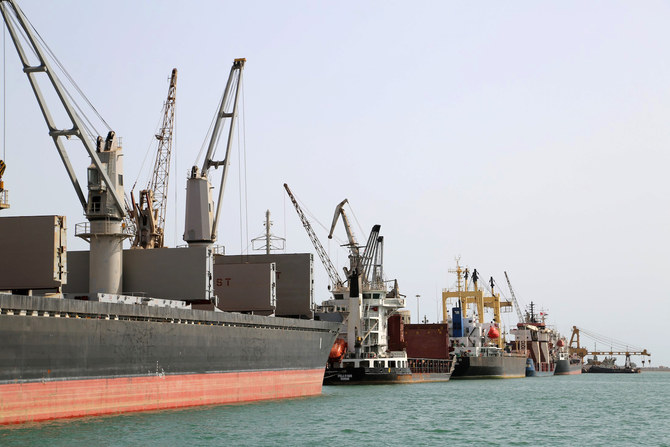Houthis’ retreat from Hodeidah hints at Iran’s mindset

The UN’s announcement at the weekend that Yemen’s Houthi militia had begun withdrawing from Hodeidah port must be welcomed, as long as the group’s departure is completed, as was announced on Twitter by its leadership.
The port issue has been a sticking point in UN efforts to mediate between the warring parties for months. It wanted the Houthis to hand over the port as a step toward improving the humanitarian situation in the country.
Hodeidah is the main international entry point for 70 percent of imports and humanitarian aid to Yemen, where the four-year civil war has killed an estimated 60,000 people and pushed much of the country to the brink of famine. Nearly two-thirds of Yemenis are in need of some sort of aid and 3 million have been displaced. According to the UN, thousands are said to have died of malnutrition, preventable diseases and epidemics.
The Stockholm deal signed in late 2018 was supposed to pave the way, through the humanitarian channel, for concrete steps to a negotiated end to the conflict between the Iran-backed Houthi militia and the elected government of Abed Rabbo Mansour Hadi, backed by the Saudi-led Arab coalition.
Many in the Middle East welcomed with skepticism the Houthi announcement, but they have all questioned its timing. The Stockholm agreement had been stalled for months, but it seems that Iran, which is starting to cave in under the intensified US sanctions regime, could be sending a signal telling the international community that it is still a key player in the region, and that the latest US warmongering against Tehran is misplaced, as it still has a lot to offer in moves toward a more peaceful region.
Such skepticism was expressed by the Yemeni Information Minister Muammar Al-Iryani, who described the Houthi pullout as a “flagrant show” aimed at misinforming the international community ahead of a meeting of the UN Security Council. Al-Iryani even declared that “a group of (Houthi) militiamen left and they were replaced by others wearing coast guard police uniforms.”
Though the UN was due to verify the Houthis’ withdrawal, Al-Iryani has been echoing what all Yemenis know: That the Houthis control all aspects of the security apparatus in the areas under their control. And everyone knows that this militia takes its cues from Tehran.
Many in the Middle East welcomed with skepticism the Houthi announcement, but they have all questioned its timing.
Mohamed Chebaro
True, Iran could play a key role in Middle Eastern stability and prosperity if it abandoned its 40-year-old rhetoric that it is bent on interfering in neighboring countries’ internal affairs. Since its inception, the Islamic Republic has pledged to export its revolutionary mantras encouraging minorities, mainly Shiite Arabs, to rise up against central government rule in various parts of the Arab world.
During those years, Tehran has not shied away from sowing discord, propping up militias, mounting hostage-taking operations, and bombing military encampments, all in its bid to gain the upper hand.
The timing of the Houthis’ withdrawal from Hodeidah is, according to many, linked to a twin-track policy Iran seems to have decided to adopt, and which it always uses when its regime is facing an existential threat.
On the one hand, it appeals to Western audiences through its civilian authority and so-called moderate president and foreign minister, who stipulate Iran’s peaceful interests. They refuse any sort of diktat that would dent Iran’s national pride or show Tehran as a weak player, and insist that the country does not harbor plans to produce nuclear weapons or destabilize the region.
On the other hand, the Islamic Revolutionary Guard Corps and various firebrand leaders connected to the highest ranks of the theocracy that leads the country attack the West and threaten to close the Strait of Hormuz and the Bab Al-Mandab Strait, both vital transit arteries for the world’s oil.
US President Donald Trump recently reminded the world that he is ready for direct talks with Iran to discuss his objections to the nuclear deal, which he believes does not go far enough in addressing Tehran’s destabilizing role in the Middle East. It has been reported that the Swiss ambassador in Tehran, whose country has been the guardian of US interests in Iran since 1979, has been given Trump’s number — a hint that the ball is in Iran’s court if it is ready to renegotiate a broader deal that could end the enmity between Iran and the West, or at least limit Iran’s missile proliferation and destabilizing role in the region, as well as its nuclear ambitions.
The Houthi withdrawal and the subsequent apparent sabotage of four oil tankers close to the UAE are the kind of ploys Iran knows how to time and execute. Hence, it was no surprise the US announced earlier in May that it is beefing up its military presence in the Gulf region for fear of direct or proxy reprisals from Iran.
- Mohamed Chebaro is a British-Lebanese journalist with more than 25 years’ experience covering war, terrorism, defense, current affairs and diplomacy. He is also a media consultant and trainer.









































